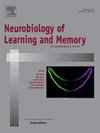后脾皮层在延迟空间交替中的作用
IF 1.8
4区 心理学
Q3 BEHAVIORAL SCIENCES
引用次数: 0
摘要
后脾皮层(RSC)在空间认知中发挥着重要作用。RSC神经元表现出多种空间发射模式,病变研究发现,RSC是空间工作记忆任务所必需的。然而,人们对 RSC 神经元如何在延迟期编码空间记忆知之甚少。在本研究中,我们对对照组大鼠和 RSC 发生兴奋性损伤的大鼠进行了不同延迟时间的空间交替任务训练,并在另一组大鼠中记录了大鼠执行交替任务时 RSC 神经元的活动。我们发现,RSC 损伤会明显影响交替任务的表现,尤其是在延迟时间最长的情况下。我们还发现,RSC 神经元在左侧和右侧试验前的整个延迟期表现出可靠的不同发射模式,这与工作记忆信号一致。而在出错前的延迟期内,这些不同的发射模式则不存在。我们还发现,在试验开始前,许多 RSC 神经元的发射率会出现一个很大的尖峰。这些试验开始时的反应中,有许多还区分了左右试验,这表明它们可能在 "向左 "或 "向右 "行为反应中起了引物作用。我们的研究结果表明,这些发射模式代表了关键的记忆信息,是 RSC 在空间工作记忆中发挥作用的基础。本文章由计算机程序翻译,如有差异,请以英文原文为准。
The retrosplenial cortical role in delayed spatial alternation
The retrosplenial cortex (RSC) plays an important role in spatial cognition. RSC neurons exhibit a variety of spatial firing patterns and lesion studies have found that the RSC is necessary for spatial working memory tasks. However, little is known about how RSC neurons might encode spatial memory during a delay period. In the present study, we trained control rats and rats with excitotoxic lesions of the RSC on spatial alternation task with varying delay durations and in a separate group of rats, we recorded RSC neuronal activity as the rats performed the alternation task. We found that RSC lesions significantly impaired alternation performance, particularly at the longest delay duration. We also found that RSC neurons exhibited reliably different firing patterns throughout the delay periods preceding left and right trials, consistent with a working memory signal. These differential firing patterns were absent during the delay periods preceding errors. We also found that many RSC neurons exhibit a large spike in firing rate leading up to the start of the trial. Many of these trial start responses also differentiated left and right trials, suggesting that they could play a role in priming the ‘go left’ or ‘go right’ behavioral responses. Our results suggest that these firing patterns represent critical memory information that underlies the RSC role in spatial working memory.
求助全文
通过发布文献求助,成功后即可免费获取论文全文。
去求助
来源期刊
CiteScore
5.10
自引率
7.40%
发文量
77
审稿时长
12.6 weeks
期刊介绍:
Neurobiology of Learning and Memory publishes articles examining the neurobiological mechanisms underlying learning and memory at all levels of analysis ranging from molecular biology to synaptic and neural plasticity and behavior. We are especially interested in manuscripts that examine the neural circuits and molecular mechanisms underlying learning, memory and plasticity in both experimental animals and human subjects.

 求助内容:
求助内容: 应助结果提醒方式:
应助结果提醒方式:


